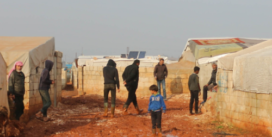- Fall Newsletter, 2025, Issue 15
- Using International Online Learning Modules to Engage Students in the Study of Critical Global Issues
- Upcoming Book Launch: Hearts of Freedom
- Announcing winners of the 2025 CARFMS Essay Contest
- The New York Declaration for Refugees and Migrants and its two Global Compacts: Addressing the Symptoms or the “Root Causes” of Forced Displacement?*
2018 Essay Contest Abstracts – Graduate Students
Winner:
Dina Taha, York University
“Like a tree without leaves”: Syrian refugee women and the shifting meaning of Marriage”
This paper is part of a broader study that I conducted during my fieldwork in Egypt summer of 2017 where I interviewed Syrian refugee women who escaped the conflict in Syria and married Egyptian men after 2011 once they settled. I aim to reveal those women’s resourcefulness and complex understanding of marriage as a survival mechanism against displacement and highlight how the latter, in turn, has reshaped the Syrian refugee woman’s perceptions of marriage and survival. Particularly, I use an anticolonial feminist framework to pinpoint some conceptual challenges that their narratives impose on notions central to liberal feminist analysis such as agency, marriage, and victimhood. I propose that a theoretical de-coupling of notions such as agency and resistance as well as vulnerability and victimhood are essential for more nuanced understanding of the gendered refugee experience.
Runners-up:
Aryan Karimi, University of Alberta
“Limits of Social Capital for Refugee Integration: A Case of Iranian Gay Refugees Integration in Canada”
Each year thousands of refugees, including racialized Sexual-Orientation-Gender-Identity refugees are resettled in Canada. Currently, economic-independence is the foremost policy goal in integrating refugees in Canada. These policies, informed by market-citizenship, rely on social capital as a non-economic solution to integration. I draw on 32 interviews with Iranian gay refugees and their experiences of resettlement in Canada to argue that overreliance on refugees. deployment of social capital for integration has grave shortcomings for refugees mental health and senses of belonging. I suggest that examining racialized-SOGI refugees. integration strategies best reveals social capital.s flaws at intersections of sexuality, gender, race, class, and migration background. I draw on Bourdieu’s writings on social capital to underline internal group differences, social inequalities, and the vital convertibility between financial, social, and cultural capital in building transferrable resources for refugee integration. I will conclude by urging for pragmatic-empirical studies based on bottom-up intersectional analyses of modalities of forming social capital and for states. intervention in facilitating integration.
Lorielle Giffin, Ryerson University
“Canadian Children Behind Bars: How De Facto Detention Violates the Principle of Non-Discrimination”
In Canada, immigration detention is used to detain migrants—sometimes indefinitely—pending the deportation process. This detainment occurs despite the fact that these migrants have not been charged with a criminal offence. In recent years, Canadian children have been subjected to immigration detention while being held with their migrant parents. This paper examines the de facto detainment of Canadian children in immigration detention using a human-rights lens. Specifically, it is argued that the de facto detainment of Canadian children violates the principle of non-discrimination found in domestic and international human rights instruments. A connection between this rights violation and subsequent harms experienced by detained Canadian children is made. The theory of ‘crimmigration’ proposed by Juliet Stump (2006) is used to critically analyze the violation of the human rights of Canadian children in immigration detention. This paper concludes with a discussion concerning the implementation of alternatives to detention for children.
Jenny Poon, University of Western Ontario
“Non-Refoulement Obligations under Article 1F(a) of the Refugee Convention”
This paper explores the intersection between international criminal law and international refugee law by examining the threshold necessary to establish culpability under Article 1F(a) of the Convention Relating to the Status of Refugees for an asylum claimant who has committed “a crime against peace, a war crime, or a crime against humanity”. The definition of “a crime against peace, a war crime, or a crime against humanity” as defined under the Rome Statute of the International Criminal Court as well as jurisprudence from international courts and tribunals will be discussed. Given the wide-ranging implications of excluding an asylum claimant from refugee status, it is important to bring clarity to the law on what constitutes “serious reasons for considering” culpability threshold so that those deserving of international protection are not excluded from refugee status, which may heighten the possibility of them being sent back to persecution violating the principle of non-refoulement.
